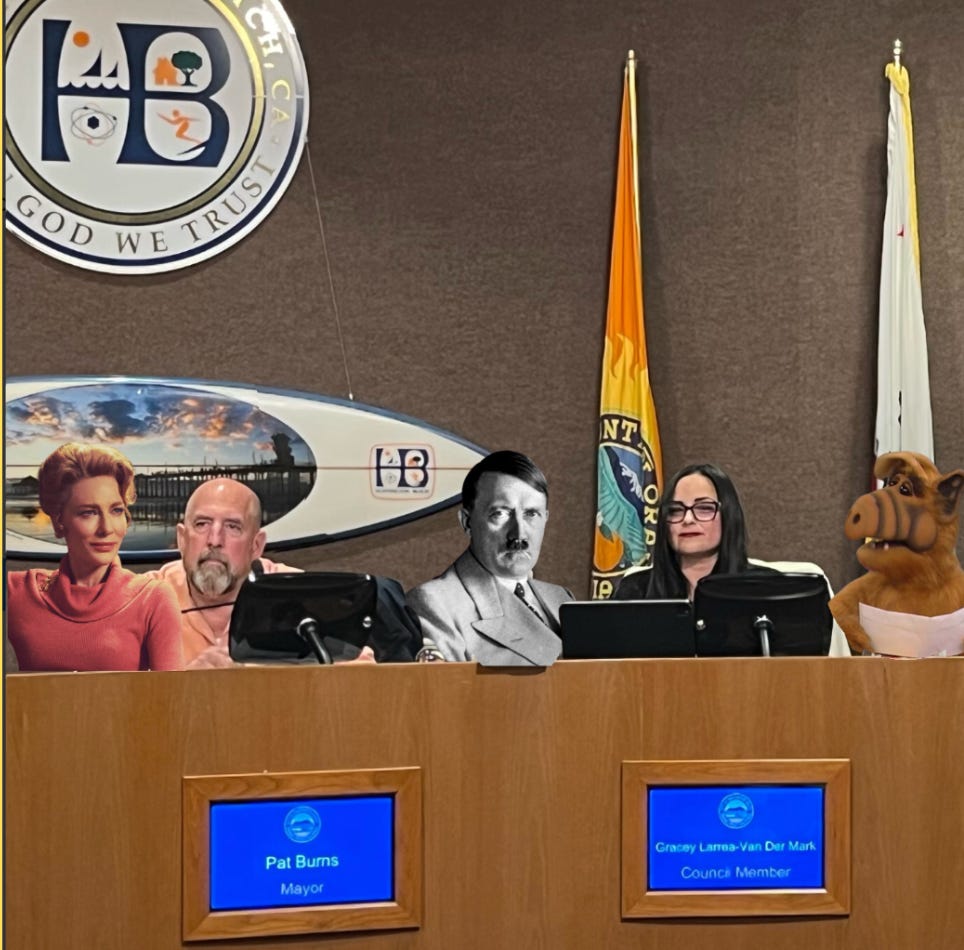Book banning isn't about content. It's about control.
A guest post from a Texas-based Air Force veteran and bookstore owner who is sick of censorship and itching to speak up.

By Joe Mayes/Guest Contributor to The Truth OC
“Any book worth banning is a book worth reading.”
― Isaac Asimov
Book banning isn’t really about protecting anyone. Not even the children. It’s about control.
Control over what people think. Controlling what people know. Controlling what people feel safe doing. Author Stephen King said this: “Censorship and the suppression of reading materials are rarely about family values and almost always about control; About who is snapping the whip, who is saying no, and who is saying go.”
Even in Nazi Germany, book banning wasn’t absolute. Most banned books weren’t destroyed. They were placed in closed Nazi libraries where they were only available to scholars and trusted adults. It wasn’t about eliminating the ideas. It was about hiding them from the citizenry.
The Nazis burned literature (after keeping copies for themselves) that was seen as immoral, indecent, or was opposed by patriotic Germans.
Sound familiar?
Virtually every community in the United States today is having, or has had, some level of discussion about what books should be available to that community, in particular the children.
Most of those discussions are bullshit.
Book bans are predominantly political theater. Yes, there are some true believers who hold that “Catcher In The Rye” will embolden children to, I don’t know … maybe look askance at the institutions that exercise control over them? Swear? Smoke? Rebel? Spoiler alert, to those who haven’t raised children: They will do all of these things. And more.
The truth is, most book bans are simply political theater. They are a means to further the political agenda of a person or a group of people. In most cases in the US, bans are simply the imposition of a moral code of one group of people on everyone else. All to the political benefit of the loudest advocate.
Here’s one example of the type of political theater I’m talking about.
In October 2023, the Huntington Beach City Council approved Resolution 2023-41 which directed staff to relocate children’s books that “may be deemed as inappropriate or obscene” to another section of the library. While there was little clarity on what constituted “inappropriate or obscene”—“Precise details on the policy remain unclear.”—HB City Councilwoman Gracey Van Der Mark did her best to help. She read “instructions” for sexual activities such as fisting, oral sex and the use of various sex toys, as well as an excerpt from a book describing masturbation as a “lovely shivering feeling.” [1]
Then, in September 2024, Governor Gavin Newsom signed Assembly Bill 1825, the California Freedom to Read Act. The intent of this bill was essentially to ban book bans like those in Huntington Beach.
Just a month prior to Governor Newsom signing AB1825, Huntington Beach City Attorney Michael Gates vowed to fight the California Freedom to Read Act in court. In other words, to seek a ban to the book banning ban.
Like all good theater, the entire exchange in Huntington Beach was quite entertaining. That is, as long as you didn’t live in Huntington Beach. [2]
Alas, it appears Huntington Beach’s fight against the California Freedom to Read Act will have to be taken up by Gates’ replacement. On February 10, 2025, it was announced that he had been appointed to the United States Department of Justice as Deputy Assistant Attorney General, Civil Rights Division.
“I am profoundly humbled and honored for this opportunity to serve the American people at a time like this—to advance President Trump's ‘America First’ agenda, fight to restore law and order throughout the country, and fight to restore faith in the Nation's justice system.”
To cite myself, it sounds like this book ban ban ban furthered the political agenda of Michael Gates.
Theatrical. Political. Book banning.
But while this political theater is somewhat amusing (again, from afar), it is merely the left hand waving while the right hand does the real damage. Proponents of these book bans insist they are not “banning” books; they are simply classifying them to protect the children. It’s always about protecting the children.
But this “protecting the children” is little more than smoke and mirrors. It’s really about controlling what information is available to the citizens of a community.
While Florida is always entertaining—my favorite was their banning of Alan Gratz’s book, “Ban This Book,” a book about the hazards of banning books—I’m going to use an example from Texas.
In 2023, Texas House Bill 900, the READER Act (Restricting Explicit and Adult Designated Educational Resources) was introduced. HB900 would hold booksellers—called “library material vendors” in the legalese—liable for selling, or exhibiting for sale, “harmful materials” to minors.
The onus of protecting children would fall to booksellers, who would have been required to perform a “contextual analysis” of the material to determine whether the material describes, depicts, or portrays sexual conduct in a way that is patently offensive.
While HB900 was passed by the Texas legislature, the American Booksellers Association, Association of American Publishers, Authors Guild, comic Book Legal Defense Fund, and two independent bookstores—BookPeople in Austin and Blue Willow Bookshop in Houston—filed a lawsuit to block enforcement of the law. On January 17, 2024, the US Fifth Circuit Court of Appeals ruled that the Texas Education Agency was prohibited from enforcing HB 900 requirements that book vendors rate library materials as sexually explicit or sexually relevant.
Full disclosure: My family owns a bookstore in Texas. We would have been faced with having to perform “contextual analyses” on the thousands of titles we carry in our small, independent store. Faced with having to perform that level of critical analysis on so many books, most Texas booksellers that we’ve spoken with would not have been able to remain in business. Thus reducing the sources of books in the communities.
Yes, Theatrical. Yes, Political. But also slowly eroding access to books.
But it doesn’t end there.
Texas Penal Code (Section 43.24) actually criminalizes the selling—or even exhibiting—of “harmful material” to minors (anyone younger than 18-years old). The statute defines “harmful material” as any which, a) appeals to the prurient interest of a minor, in sex, nudity, or excretion; b) is patently offensive to prevailing standards in the adult community as a whole with respect to what is suitable for minors; and c) is utterly without redeeming social value for minors.
The absurdity and hypocrisy of this statute is baked into the statute itself. It specifies that one defense to prosecution under this statute would be if the person providing the “harmful material” to the minor was, in fact, the spouse of the minor at the time of the offense.
In other words, it is a crime in Texas to give, or even show, a minor a book that contains references to sex.
But it’s OK to marry them.
Theatrical. Political. And decidedly unentertaining to booksellers in Texas.
Joe Mayes is a writer, bookstore owner, and all 'round good egg. He retired following 20 years in the US Air Force, then another 23 years in nonprofit management and Cybersecurity. He lives in north Texas with his wife, Diane. He has strong opinions.


You forgot to mention just how dashingly handsome this cat is...